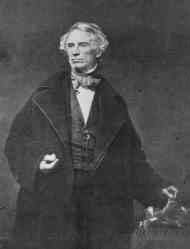Morse Code
Samuel Morse
Article on Morse to follow
Alphabet & Numerics
| .---- | ..--- | ...-- | ....- |
| 1 | 2 | 3 | 4 |
| ..... | -.... | --... | ---.. |
| 5 | 6 | 7 | 8 |
Sending Signals
| AAAAA..... | AAA | -Pause- | EEEEE...... |
| Call Sign - (I have a message) | End of sentence (More follows) | End of Word (More follows) | Error (Start from last correct word) |
| AR | BT | DN | KN |
| End of Message | Double Dash | Slant Bar (/) | Invite a specific station to transmit |
Receiving Signals
| TTTTT....... | K | T | IMI |
| I'm receiving you | I am ready (Start message) | Word received | Repeat Sign (I do not understand) |
Timing
In Morse code, timing is important to ensure that a coherent message is received. The actual length of a dot can be as long as you like, but obviously it should be short enough that messages can be sent quickly and long enough to be heard over great distances. Once this standard unit of time has been established, a dash should last three times as long as a dot. The pause between individual dots and dashes should take as long as a single dot, the pause between two characters should take as long as a dash and the pause between two words should be twice as long as a dash (six times as long as a dot).
